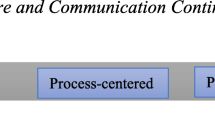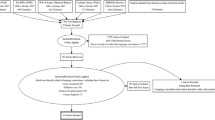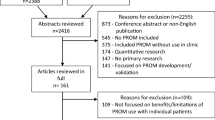ABSTRACT
BACKGROUND
Low health literacy (HL) is associated with poor healthcare outcomes; mechanisms for these associations remain unclear.
OBJECTIVE
To elucidate how HL influences patients’ interest in participating in healthcare, medical visit communication, and patient reported visit outcomes.
DESIGN, SETTING, AND PATIENTS
Cross-sectional study of enrollment data from a randomized controlled trial of interventions to improve patient adherence to hypertension treatments. Participants were 41 primary care physicians and 275 of their patients. Prior to the enrollment visit, physicians received a minimal intervention or communication skills training and patients received a minimal intervention or a pre-visit coaching session. This resulted in four intervention groups (minimal patient/minimal physician; minimal patient/intensive physician; intensive patient/minimal physician; and intensive patient/intensive physician).
MEASUREMENTS
Rapid Estimate of Adult Literacy in Medicine; patients’ desire for involvement in decision making; communication behaviors; patient ratings of participatory decision making (PDM), trust, and satisfaction.
RESULTS
A lower percentage of patients with low versus adequate literacy had controlled blood pressure. Both groups were similarly interested in participating in medical decision making. Communication behaviors did not differ based on HL except for medical question asking by patients, which was lower among low literacy patients. This was particularly true in the intensive patient /intensive physician group (3.85 vs. 6.42 questions; p = 0.002). Overall, ratings of care didn’t differ based on HL; however, in analyses stratified by intervention assignment, patients with low literacy in minimal physician intervention groups reported significantly lower PDM scores than adequate literacy patients.
CONCLUSIONS
Patients with low and adequate literacy were similarly interested in participating in medical decision making. However, low literacy patients were less likely to experience PDM in their visits. Low literacy patients in the intensive physician intervention groups asked fewer medical questions. Patients with low literacy may be less able to respond to physicians’ use of patient-centered communication approaches than adequate literacy patients.
Similar content being viewed by others
REFERENCES
Kutner M, Greenberg E, Jin Y, et al. The health literacy of America’s adults—Results for the 2003 national assessment of adult literacy. Washington, DC: US. Department of Education; 2006:i–60. Available at http://nces.ed.gov/pubs2006/2006483.pdf. Accessed April 10, 2013.
Kirsch IS, Jungeblut A, Jenkins L, Kolstadet A. A First Look at the Results of the National Adult Literacy Survey. Nat’l Center for Education Statistics, 1993. Available at http://nces.ed.gov/pubsearch/pubsinfo.asp?pubid=93275. April 10, 2013.
Williams MV, Baker DW, Honig EG, Lee TM, Nowlan A. Inadequate literacy is a barrier to asthma knowledge and self-care. Chest. 1998;114:1008–1015.
Baker DW, Parikh NS, Pitkin K, et al. Inadequate functional health literacy among patients at two public hospitals. JAMA. 1995;274(21):1677–1682.
Baker DW, Parker RM, Williams MV, et al. The health care experience of patients with low literacy. Arch Fam Med. 1996;5(6):329–334.
Berkman ND, DeWalt DA, Pignone MP, Sheridan SL, Lohr KN, Lux L, Sutton SF, Swinson T, Bonito AJ. Literacy and Health Outcomes. Evidence Report/Technology Assessment No. 87 (Prepared by RTI International–University of North Carolina Evidence-based Practice Center under Contract No. 290-02-0016). AHRQ Publication No. 04-E007-2. Rockville, MD: Agency for Healthcare Research and Quality. January 2004. Available at http://archive.ahrq.gov/downloads/pub/evidence/pdf/literacy/literacy.pdf Accessed April 10, 2013.
DeWalt DA, Berkman ND, Sheridan S, et al. Literacy and health outcomes. A systematic review of the literature. J Gen Intern Med. 2004;19:1228–1239.
Weiss BD, Hart G, Pust RE. The relationship between literacy and health. J Health Care Poor Underserved. 1991;1:351–363.
Weiss BD, Hart G, McGee DL, Estelle S. Health status of illiterate adults: relation between literacy and health status among persons with low literacy skills. J Am Board Fam Pract. 1992;5:257–264.
Berkman ND, et al. Low health literacy and health outcomes: an updated systematic review. Ann Intern Med. 2011;155(2):97–107.
Selden CR, Zorn M, Ratzan S, Parker RM. Health Literacy. Current Bibliographies in Medicine. Bethesda, MD: National Library of Medicine, 2000. No.2000-1. Available at: http://www.nlm.nih.gov/archive/20061214/pubs/cbm/hliteracy.pdf. Accessed April 10, 2013.
Nielsen-Bohlman L, Panzer AM, Kindig DA. 2004 Health literacy: A prescription to end confusion. Washington, DC: Institute of Medicine: National Academies Press. Available at http://www.nap.edu/openbook.php?isbn=0309091179. Accessed April 10, 2013.
Parker R, Ratzanb SC. Health literacy: a second decade of distinction for Americans. J Heal Commun. 2010;15:20–33.
Mancuso CA, Rincon M. Asthma patients assessments of health care and medical decision making: the role of health literacy. J Asthma. 2006;43:41–44.
Collins M, Crowley R, Karlawish JH, Casarett DJ. Are depressed patients more likely to share health care decisions with others? J Palliat Med. 2004;7:527–532.
Barragan M, Hicks G, Williams MV, Franco-Paredes C, Duffus W, Del Rio C. Low health literacy is associated with HIV test acceptance. J Gen Intern Med. 2005;20:422–425.
Katz MG, Jacobson TA, Veledar E, et al. Patient literacy and question-asking behavior during the medical encounter: a mixed-methods analysis. J Gen Intern Med. 2007;22:782–6.
Cooper LA, Roter DL, Bone LR, et al. A randomized controlled trial of interventions to enhance patient-physician partnership, patient adherence and high blood pressure control among ethnic minorities and poor persons: study protocol NCT00123045. Implement Sci. 2009;4:7.
Cooper LA, Roter DL, Carson KA, et al. A randomized trial to improve patient-centered care and hypertension control in underserved primary care patients. J Gen Intern Med. 2011;26(11):1297–304.
Morisky DE, Green LW, Levine DM. Concurrent and predictive validity of a self-reported measure of medication adherence. Med Care. 1986;24:67–74.
Davis TC, Long SW, Jackson RH, et al. Rapid estimate of adult literacy in medicine: a shortened screening instrument. Fam Med. 1993;25(6):391–5.
Brody DS. Patient perception of involvement in medical care: relationship to illness attitudes and outcomes. J Gen Intern Med. 1989;4(6):506–11.
Bertakis KD, Roter D, Putnam SM. The relationship of physician medical interview style to patient satisfaction. J Fam Pract. 1991;32:175–81.
Levinson W, Roter DL, Mullooly JP, Dull VT, Frankel RM. Physician patient communication. The relationship with malpractice claims among primary care physicians and surgeons. JAMA. 1997;277:553–59.
Roter DL. Patient participation in the patient–provider interaction: the effects of patient question asking on the quality of interaction, satisfaction and compliance. Health Educ Monogr. 1977;5:281–315.
Wissow LS, Roter D, Bauman LJ, et al. Patient–provider communication during the emergency department care of children with asthma. The National Cooperative Inner-City Asthma Study, National Institute of Allergy and Infectious Diseases, NIH, Bethesda, MD. Med Care. 1998;36:1439–50.
Roter DL, Larson S. The relationship between residents’ and attending physicians’ communication during primary care visits: an illustrative use of the Roter Interaction Analysis System. Health Commun. 2001;13(1):33–48.
Roter D, Larson S. The Roter interaction analysis system (RIAS): utility and flexibility for analysis of medical interactions. Patient Educ Couns. 2002;46(4):243–51.
RIAS Works. Available at http://www.riasworks.com/. Accessed April 10, 2013.
Kaplan SH, Gandek B, Greenfield S, Rogers W, Ware JE. Patient and visit characteristics related to physicians’ participatory decision-making style. Results from the medical outcomes study. Med Care. 1995;33(12):1176–87.
Kaplan SH, Greenfield S, Gandek B, Rogers WH, Ware JE Jr. Characteristics of physicians with participatory decision-making styles. Ann Intern Med. 1996;124(5):497–504.
Anderson LA, Dedrick RF. Development of the trust in physician scale: a measure to assess interpersonal trust in patient-physician relationships. Psychol Rep. 1990;67(3 Pt 2):1091–100.
Cooper LA, Roter DL, Johnson RL, Ford DE, Steinwachs DM, Powe NR. Patient-centered communication, ratings of care, and concordance of patient and physician race. Ann Intern Med. 2003;139(11):907–15.
The Seventh Report of the Joint National Committee on Prevention, Detection, Evaluation, and Treatment of High Blood Pressure (JNC 7) Available at http://www.nhlbi.nih.gov/guidelines/hypertension/. Accessed on April 10, 2013.
Parikh NS, Parker RM, Nurss JR, Baker DW, Williams MV. Shame and health literacy: the unspoken connection. Patient Educ Couns. 1996;27(l):33–9.
Schillinger D, Bindman A, Wang F, Stewart A, Piette J. Functional health literacy and the quality of physician–patient communication among diabetes patients. Patient Educ Couns. 2004;52:315–323.
Bass PF 3rd, Wilson JF, Griffith CH, Barnett DR. Residents’ ability to identify patients with poor literacy skills. Acad Med. 2002;77(10):1039–41.
Sheridan SL, et al. Interventions for individuals with low health literacy: a systematic review. J Heal Commun. 2011;16:30–54.
Pringle M, Stewart-Evans C. Does awareness of being video recorded affect doctors’ consultation behaviour? Br J Gen Pract. 1990;40:455–58.
Wolraich ML, Albanese M, Stone G, et al. Medical communication behavior system. An interactional analysis system for medical interactions. Med Care. 1986;24:891–903.
Frisch A-L, Camerini L, Diviani N, Schulz PJ. Defining and measuring health literacy: how can we profit from other literacy domains? Health Promot Int. 2012;27(1):117–126.
Nutbeam D. Health literacy as a public health goal: a challenge for contemporary health education and communication strategies into the 21st century. Heal Promot Int. 2000;15:259–267.
Schulz PJ, Nakamoto K. Emerging themes in health literacy. Stud Commun Sci. 2005;5:1–10.
Jordan JE, Buchbinder R, Osborne RH. Conceptualizing health literacy from the patient perspective. Patient Educ Couns. 2010;79:36–42.
Zarcadoolas C, Pleasant A, Greer DS. Elaborating a definition of health literacy: a - commentary. J Heal Commun. 2003;8:119–120.
Acknowledgements
This work was supported by grants from the National Heart, Lung, and Blood Institute (R01HL069403, K24HL083113, and P50HL105187).
Conflict of Interest
Dr. Aboumatar has no conflict of interest. Ms. Karson has received grant support from Gilead Sciences for a pulmonary research grant. Dr. Roter is the author of the Roter Interaction Analysis System (RIAS) and holds the copyright for the system. Johns Hopkins University also has rights to the RIAS coding software. Neither Debra Roter nor Johns Hopkins collects royalties for use of the system in research. Dr. Roter is also the co-owner of RIASWorks LLC, a company that provides RIAS coding services for non-university projects. It is possible that RIASWorks would benefit indirectly from dissemination of the current research. Dr. Beach has received honoraria from Merck for giving non-product based presentations on doctor-patient communication and relationship-centered care. Dr. Cooper has served as consultant for Talaria, Inc. Training, Research, & Healthcare Education in August 2010.
Author information
Authors and Affiliations
Corresponding author
Rights and permissions
About this article
Cite this article
Aboumatar, H.J., Carson, K.A., Beach, M.C. et al. The Impact of Health Literacy on Desire for Participation in Healthcare, Medical Visit Communication, and Patient Reported Outcomes among Patients with Hypertension. J GEN INTERN MED 28, 1469–1476 (2013). https://doi.org/10.1007/s11606-013-2466-5
Received:
Revised:
Accepted:
Published:
Issue Date:
DOI: https://doi.org/10.1007/s11606-013-2466-5




